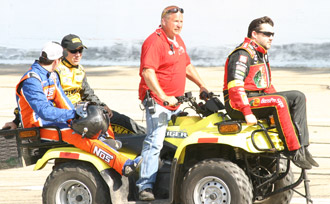Track manager, philanthropist: Campus Services supervisor gives back
As the Partners in Giving campaign enters its last few weeks, some of its strongest support comes from a small basement office on Charter Street.

Dave Grueneberg, head of UW–Madison’s Campus Services and track manager of Madison International Speedway, drives a four-wheeler with NASCAR drivers (from left) Kyle Busch, Matt Kenseth and Tony Stewart.
Dave Grueneberg, head of Campus Services, keeps a low profile. He values the straightforward nature of his job: people call when they need something moved or delivered; he and his crew get it done. His office gives few clues about his life away from campus.
Get him talking, though, and he’ll tell you about the mug with the checkered flag.
“[Stock car driver] Matt Kenseth’s father managed and promoted Madison International Speedway,” says Grueneberg. “When he started working on Matt’s museum, he asked if I would take over the management part. Now I run the track.”
It’s a long way from Grueneberg’s days as a Memorial Library janitor. He still works both jobs, along with his own business selling tires at the track, but he considers himself fortunate to do what he loves. So when he found himself in a position to give back, he quietly put the wheels in motion.
Since 2005, Grueneberg has matched 100 percent of his employees’ contributions to Partners in Giving, the annual workplace charitable campaign for state, university and UW Hospital and Clinics employees in Dane County.
Since 2005, Grueneberg has matched 100 percent of his employees’ contributions to Partners in Giving, the annual workplace charitable campaign for state, university and UW Hospital and Clinics employees in Dane County. This year’s campaign is raising money for more than 500 charities.
“Dave is an exceptional supervisor and one of the hardest working people I know,” says Kris Ackerbauer, Physical Plant assistant director. “His donation-rate-to-salary has got to be the highest of anybody I could imagine on campus; it’s inspiring. He’ll walk around saying, ‘Geez, I don’t know if I can lay out any more money this year,’ but he’s doing it to drive his guys into giving more.”
Grueneberg started his efforts while supervising the overnight waste and recycling teams (a position that gave him more time at the track). He drew on his own experiences when handing out the donation packets.
“My plan to get the crew to donate, as very few would, was that I’d match whatever they gave with a contribution to HospiceCare [now Agrace HospiceCare]. They’ve done a lot for people I know,” says Grueneberg, citing close family, friends and employees who have passed away from cancer. “I said, ‘I’d like you all to look at all the organizations in the book; I can guarantee that some organizations in there have helped a family member or someone close to you.’ We went from very few donations to anywhere from $400-$700 per year.”
When Grueneberg came to Campus Services, his crew doubled in size. He chose to continue anyway. A few employees realized that if they gave even five or ten dollars every pay period, they could contribute $250 over the course of a year. In 2009, Grueneberg paid out nearly $1,700 in matching funds.
“Big shock to me!” he says. “This year, I didn’t think they would be up for giving much. Bad idea on my part; as of this week, we’re at $1,721 with some still left to come in.”
Grueneberg gives because he has personally experienced the impact of hospice services. He extends these values to his work. When he arrived at Campus Services in 2008, he immediately hopped on a truck to check out his crew, stop by stop. In a job that demands hours of heavy labor, Grueneberg’s workers never do anything he wouldn’t do himself. They trust him as an advocate.
When he challenges his employees to give, he draws on the same kind of trust.
“Say you go through what they’ve gone through in the last year, with all of the uncertainty and cuts. If you ask someone to give money to something, what do you think they’ll say? ‘Yeah, right’ – and they throw the flyer in the trash.” Grueneberg smiles. “But 60 percent of my guys donate, one way or another.”
Tags: faculty and staff
